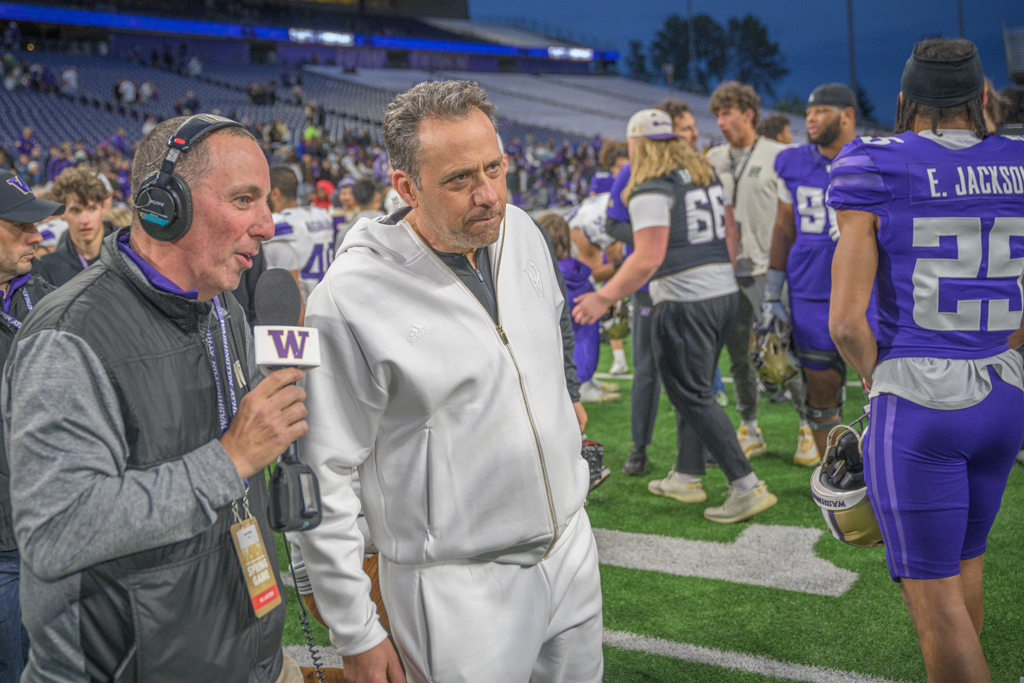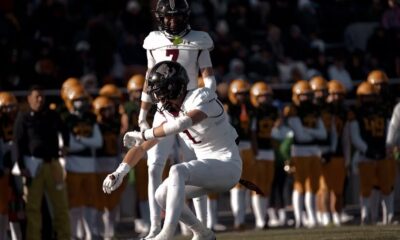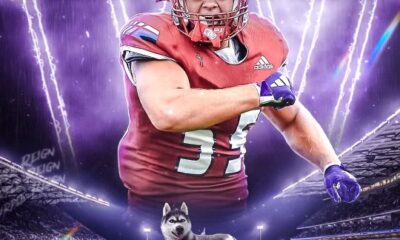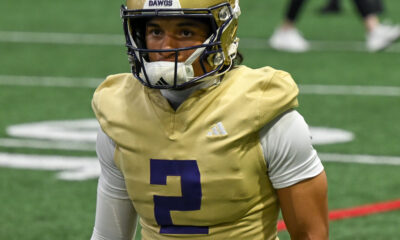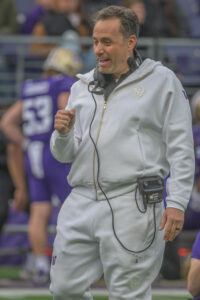
HillaryButlerPhotography.com
When then-athletic director University of Washington Troy Dannen introduced new head coach Jedd Fisch in the press conference in January, Fisch was forced to toe an uncomfortable line.
On one hand, he was taking over for a team that, eight days earlier, was playing in the national championship game. Simultaneously, he was tasked with a mini-reset project, starting from scratch with a roster that, come September, wouldn’t even faintly resemble the one that took the field against Michigan.
After all, a Heisman runner-up quarterback isn’t easy to replace. Neither is a top-three Biletnikoff Award finisher, or his three fellow NFL receivers.
Add to that that none of five starters from the Joe Moore-winning offensive line will return to Montlake. Nor would NFL tight ends Devin Culp and Jack Westover, or running back Dillon Johnson.
On the defensive side, gone is defensive end Bralen Trice, linebacker Eddie Ulofoshio, and safety Dom Hampton all to the NFL Draft. Top cornerback Jabbar Muhammad flocked to enemy territory down in Eugene. The list goes on.
In other words, if you’re already searching for flights to Atlanta for the 2025 CFP National Championship game, it’s probably time to temper those expectations.
“These guys have no problem knowing how to win,” Fisch said in January. “Now, a lot of the guys who were currently here weren’t necessarily starters during the national championship game and throughout this run. They know how to work, they know what it feels like to be a part of a championship team, a lot of them have a lot of reps in games.”
When Washington’s new head man began his previous job at Arizona, he was tasked with a full-force rebuild; the Wildcats had won just nine games in the previous three seasons combined. With it, he was handed the keys to revitalize a program that didn’t know what it felt like to win.
But this program, and many of the players remaining, now are used to winning on Montlake.
“We’re going to have to figure out that balance of building what would be our culture of brotherhood, and love, and respect and accountability, to mix in with the brotherhood that’s already here,” Fisch said.
At this job, Fisch is caught in a quagmire of expectations. The bar at Washington has been raised impossibly high by his predecessor, who took just two years to win the conference and play for the national championship. A regression to Washington’s historical mean this season — fair or not — would come as a disappointment, when compared to the exhilaration of 2023.
At the same time, 2024 will be a quasi-rebuild year for Washington, and Fisch will get the benefit of the doubt as he implements his system in Seattle. Unless the Huskies somehow get embarrassed by an FCS team in week one (or Fisch strikes a player on the sideline), he won’t be on the hot seat anytime soon, even if the Huskies struggle early on. Fisch didn’t inherit a national championship-ready roster, and it was set to be a transitory year for UW regardless. Not to mention, that “maniacal” recruiting approach he touts — which already has paid dividends for the future — won’t see an on-field impact in year one.
But, while the bar is certainly lower than the natty-or-bust mindset that Washington carried last year, that doesn’t mean Fisch and his staff will get a free pass.
Quarterback Will Rogers and receiver Jeremiah Hunter – two touted transfers who committed to DeBoer – have the potential to be a forceful duo. Arizona transfer Jonah Coleman should spark the running game, along with the return of sixth-year senior Cam Davis. The fractured offensive line is one of the main question marks on the roster, and could make-or-break Fisch’s first season.
On the defensive side, Washington brings in transfers on the defensive line, and a plethora of experience at linebacker and in the secondary.
The roster, while decimated in comparison to last year’s No. 2 team in the country, still has potential to contend in the Big Ten. And, for all the talk of the daunting new conference, Washington’s schedule is less of a gauntlet than it was a year ago.
Weber State, Eastern Michigan, Washington State, Northwestern, Indiana, and UCLA are all games that the Huskies should be favored in, and would set the baseline at six wins without even considering the remainder of the schedule.
Losing to Washington State on a regular basis would be tantamount to a resignation letter by Fisch, and the standard should be set in year one to beat the Cougars. Washington’s other rival is not going to be easy to topple at Autzen Stadium, but then again, we’ve seen the underdog Huskies take down the Ducks before.
Failing to qualify for a bowl game would instantly throw the Fisch hire into question. Winning 6-7 games wouldn’t be catastrophic, but would leave much to be desired. Chris Petersen went 8-6 in his first season, then two years later won 12 games and went to the College Football Playoff. Jimmy Lake didn’t complete his first full season.
Then, there’s Kalen DeBoer.
It’s unfortunate that DeBoer is now the ghost to chase for any new Washington head coach, but after he won 11 games in 2022, the framework has been established for coaching debuts. While DeBoer left Washington, the standard of success didn’t leave with him.
There are 8-9 very winnable games on the Huskies’ regular season schedule – adding Rutgers, USC, and Iowa to the aforementioned six games, so a 9-3 season would qualify as a resounding success in year one for Fisch and his staff.

